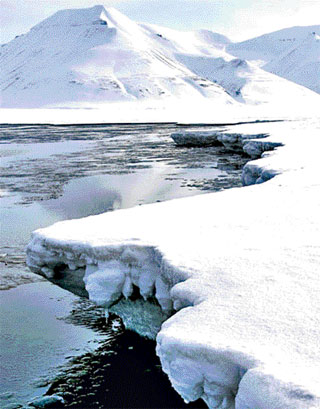|

NASA to embark on last leg of Arctic sea study
" The US space agency said on June 21 it is sending a team of
scientists on the second and final mission of a NASA field study of how
melting Arctic ice is changing the life cycles of sea creatures.
|

Life cycle of sea creatures drastically impacted by melting
arctic ice. |
The five-week mission, which kicked off on June 25, focuses on tiny
organisms called phytoplankton, whose population blooms can offer clues
about the wider health of the ocean ecosystem and how a warming climate
may change the ocean's ability to absorb carbon from the atmosphere.
Phytoplankton blooms in the Arctic have been observed to peak as many
as 50 days earlier than they did a dozen years ago, a development that
could have implications for the larger food web, scientists have said.
The microscopic organisms are the base of the food chain and drive
the food and reproductive cycles of fish, seabirds and polar bears.
How larger animals may react to phytoplankton changes is still
unknown.Phytoplankton are also important because through the process of
photosynthesis they remove about half of the harmful carbon dioxide
produced by the burning of fossil fuels worldwide.
The mission, known formally as "Impacts of Climate on Ecosystems and
Chemistry of the Arctic Pacific Environment," or ICESCAPE, combines
satellite data with on-site measurements of the Chukchi and Beaufort
seas along Alaska's coast.
"Last year, ICESCAPE nailed down quite a few things in terms of the
phytoplankton work," said chief scientist Kevin Arrigo of Stanford
University in Palo Alto, California.
We know pretty well now how fast they are growing and what they are
responding to. The repeat measurements from this voyage will help us
confirm what's going on."NASA said this year's mission begins about
three weeks later than it did last year, meaning the Healy icebreaker
should be able to better navigate the thinner, summer ice and explore
the ecosystem.
Between 2004 and 2008, "multi-year ice cover shrank 595,000 square
miles (1.5 million square kilometres) -- nearly the size of Alaska's
land area," said a 2009 report of the findings from NASA's Ice, Cloud
and Land Satellite (ICESat).
-AFP
|

